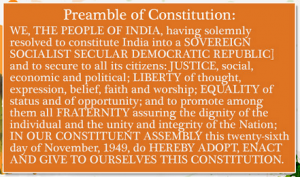This unit has been covered under the following segments-
Description of the above segments has been laid down below.
Introduction
Every constitution aims to build up a governmental structure based upon certain basic principles. And these principles are more or less well established. Although some of these principles are common to most constitution, there are others which vary from constitution to constitution. The constitution of India is not an exception to this rule and it has its own basic principles.
Preamble
THE PREAMBLE as amended in 1976 to the Indian Constitution reads :
The preamble sets out the main objects of the Constitution; the objects which the Constitution-makers intended to be realized through it. It is the key to open the mind of the Constitution-makers. The preamble is a legitimate aid in the construction of the provisions of the Constitution. Generally, for purposes of interpretation, the preamble of the Constitution stands in the same position as the preamble of an Act.
The preamble of an Act, however is not recognized as part of the Act because it is not enacted and adopted by the enacting body in the same manner as the acting provisions. The preamble of our Constitution was, however, enacted and adopted by the same procedure as the rest of the Constitution. This difference was not brought to the notice of the Supreme Court in Berubari Union and Exchange of Enclaves, Re, where it observed that “the preamble is not part of the constitution”. Later when the constituent history of the preamble was brought to the notice of the Court in Keshavananda Bharti v. State of Kerala it held that “the preamble of the Constitution was part of the Constitution and the observations to the contrary in Berubari Union case were not correct”.
The recognition of the preamble as an integral part of the Constitution makes the preamble a valuable aid in the construction of the provisions of the Constitution because unlike the permeable to an Act, the preamble of the Constitution occupies the same position as other enacting words or provisions of the Constitution.
The framers of the Constitution of India set out two purposes in the preamble. First, to constitute India into a Sovereign Democratic Republic. It is Republic because the head of the State is not a hereditary monarch. It is Democratic because the Constitution rests on the people’s will, and the institutions set up under it shall seek to give effect to democratic principles. It is Sovereign because the Constitution does not recognize the legal supremacy of another country over India. Her membership of the Commonwealth of the Nations is not inconsistent with her independent and sovereign status. The words ‘socialist’ and ‘secular’ were added in the Preamble by the Forty-second Amendment. The addition of ‘socialist’ indicates the incorporation of the philosophy of ‘socialism ‘ in the Constitution which aims at elimination of inequality in income and status and standards of life and may enable the courts to lean more and more in favour of nationalization and State ownership of an industry. It is yet to be seen how the new economic policy adopted by the Narsimha Rao Government since 1991 oriented towards free market and privatization is to be viewed in the courts. The word ‘secular’ simply recognises the concept of secularism as manifested in he guarantee of freedom of religion as a fundamental right in the Constitution. Second, to secure to citizens justice – social, economic, and political; liberty of thought, expression, faith, and worship; equality of status and opportunity; and to promote among the people of India fraternity, assuring dignity of the individual and the unity and integrity of the nation. Although the expressions, ‘justice’, ‘liberty’, ‘equality’ , and ‘fraternity’ , may not be susceptible to exact definitions, yet they are not mere platitudes. They are given content by the enacting provisions of the Constitution particularly by Part III the fundamental rights and Part IV, the Directive Principles of State Policy.
From the preamble we may make three observations in relation to the Constitution. Firstly, subject to the addition of the word “socialist” in the preamble by 42nd Amendment, it does not profess to commit the country to any particular economic order. Consistent with the Directive Principles of State Policy and within the broad framework of socialism, India may set up any economic order which the people may choose to adopt through the institutions provided for in the Constitution. Secondly, the preamble makes it clear that the Constitution emanates from the people of India and not from any external or lesser source. It is a conclusive assumption and a legal fiction which cannot be tested or questioned in any court. Thirdly, the preamble declares the great rights and freedom which the people of India intended to secure to all citizens and the basic type of government and polity which was to be established.
Forty-Second Amendment
• On 18 December 1976, during the Emergency in India, the Indira Gandhi government pushed through several changes in the Forty-second Amendment of the constitution of India.
• A committee under the chairmanship of Sardar Swaran Singh recommended that this amendment be enacted after being constituted to study the question of amending the constitution in the light of past experience.
• Through this amendment the words “socialist” and “secular” were added between the words “sovereign” and “democratic” and the phrase “unity of the Nation” was changed to “unity and integrity of the Nation.

Comments